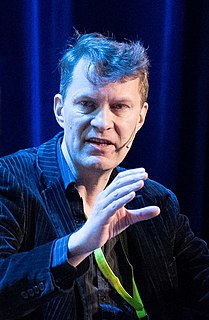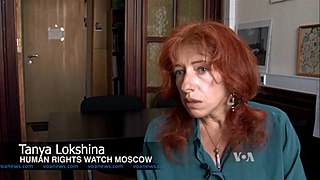Delo is a national daily newspaper in Slovenia. For more than 60 years, Delo has been involved in active co-creation of the Slovenian public space. It covers politics, economics, sports, culture and social events in Slovene. In addition to Slovenia, the paper is available in several Croatian cities and in Belgrade, Serbia. It is based in Ljubljana.

Anna Stepanovna Politkovskaya was a Russian journalist, and human rights activist who reported on political events in Russia, in particular, the Second Chechen War (1999–2005).
William A. Englund is a Pulitzer prize-winning American journalist and author. He has spent over 4 decades in the news business, most of those with The Baltimore Sun. He is currently with The Washington Post.
Yelena Tregubova is a Russian journalist. Her book The Tales of a Kremlin Digger detailed her work in the Kremlin pool.

Yevgenia Markovna Albats is a Russian investigative journalist, political scientist, writer and radio host. As of 2022, she works as a chief editor of The New Times magazine.

Ecuador–Russia relations is the bilateral foreign relations between Ecuador and Russia. Both nations are members of the United Nations.

Anastasia Baburova was a journalist for Novaya Gazeta and a student of journalism at Moscow State University. She was born in Sevastopol, Ukrainian SSR.
John Helmer is an Australian-born journalist and foreign correspondent based in Moscow, Russia since 1989. He has served as an adviser to government heads in Greece, the United States, and Asia, and has also worked as professor of political science, sociology, and journalism.
REGNUM News Agency is a Russian nationwide online news service disseminating news from Russia and abroad from its own correspondents, affiliate agencies and partners. REGNUM covers events in all regions of Russia as well as neighboring countries in Europe, Central Asia and the South Caucasus. REGNUM press centers are located in Moscow, Saint Petersburg, Pskov, Arkhangelsk, Vologda, Barnaul, Krasnoyarsk, Novosibirsk, Kaluga, Yerevan (Armenia). REGNUM is licensed as mass media service, registration certificate No. El 77-6430 issued on 6 August 2002. REGNUM is a registered trademark, certificate No. 262482.

Luke Daniel Harding is a British journalist who is a foreign correspondent for The Guardian. He was based in Russia for The Guardian from 2007 until, returning from a stay in the UK on 5 February 2011, he was refused re-entry to Russia and deported the same day. The Guardian said his expulsion was linked with his critical articles on Russia, a claim denied by the Russian government. After the reversal of the decision on 9 February and the granting of a short-term visa, Harding chose not to seek a further visa extension. His 2011 book Mafia State discusses his experience in Russia and the political system under Vladimir Putin, which he describes as a mafia state.

Clarissa Ward is a British-American television journalist, who is currently chief international correspondent for CNN. She was with CBS News, based in London. Before her CBS News position, Ward was a Moscow-based news correspondent for ABC News programs.

Edward Joseph Snowden is an American former computer intelligence consultant who leaked highly classified information from the National Security Agency (NSA) in 2013, when he was an employee and subcontractor. His disclosures revealed numerous global surveillance programs, many run by the NSA and the Five Eyes Intelligence Alliance with the cooperation of telecommunication companies and European governments, and prompted a cultural discussion about national security and individual privacy.

Sarah Harrison is a former WikiLeaks section editor. She worked with the WikiLeaks' legal defence and has been described as Julian Assange's closest adviser. Harrison accompanied National Security Agency whistleblower Edward Snowden on a high-profile flight from Hong Kong to Moscow while he was sought by the United States government.

The Donetsk People's Republic is a breakaway state located in Ukraine, formed on 7 April 2014 by pro-Russian separatists following the Ukrainian Revolution of Dignity. It is one of two breakaway states in Donbas region of eastern Ukraine, the other being the Luhansk People's Republic (LPR). Since 2014, DPR forces have been fighting against the Ukrainian Armed Forces in the Donbas War, and has received political and military backing from Russia. The capital city and largest city within the DPR is Donetsk. Denis Pushilin has served as the DPR head of state since 2018.

Ant in a Glass Jar: Chechen Diaries 1994–2004 (Russian: "Муравей в стеклянной банке. Чеченские дневники 1994–2004" is a 2014 documentary book that is an author's diary about the years spent in Chechnya from 1994 until 2004. It was written by Polina Zherebtsova, while she was 9–19 years old.

The Minsk agreements were a series of international agreements which sought to end the war in the Donbas region of Ukraine. The first, known as the Minsk Protocol, was drafted in 2014 by the Trilateral Contact Group on Ukraine, consisting of Ukraine, Russia, and the Organization for Security and Co-operation in Europe (OSCE), with mediation by the leaders of France and Germany in the so-called Normandy Format. After extensive talks in Minsk, Belarus, the agreement was signed on 5 September 2014 by representatives of the Trilateral Contact Group and, without recognition of their status, by the then-leaders of the self-proclaimed Donetsk People's Republic (DPR) and Luhansk People's Republic (LPR). This agreement followed multiple previous attempts to stop the fighting in the region and aimed to implement an immediate ceasefire.

Hanna Hopko is a Ukrainian politician and a former Member of Parliament and head of the committee on foreign affairs of Ukraine's Verkhovna Rada. She did not participate in the 2019 Ukrainian parliamentary election.
On 17 June 2014, Russian state television correspondent Igor Kornelyuk and sound engineer Anton Voloshin were victims of a mortar strike launched by the Armed Forces of Ukraine near Metalist, Slovianoserbsk Raion, Ukraine, while travelling with a group of LPR rebel separatist fighters during the ongoing war in Donbass. They were killed in the attack, along with five rebels. Cameraman Viktor Denisov was not injured in the attack.

Edward Snowden's residency in Russia is part of the aftermath from the global surveillance disclosures made by Edward Snowden. On June 23, 2013, Snowden flew from Hong Kong to Moscow's Sheremetyevo International Airport. Observing that his U.S. passport had been canceled, Russian authorities restricted him to the airport terminal. On August 1, after 39 days in the transit section, Snowden left the airport. He was granted temporary asylum in Russia for one year. On August 7, 2014, six days after Snowden's one-year temporary asylum expired, his Russian lawyer announced that Snowden had received a three-year residency permit. It allowed him to travel freely within Russia and to go abroad for up to three months.

Tanya Lokshina is a human rights researcher, journalist, and writer from Russia. She is director of the Russia program at Human Rights Watch. Tanya Lokshina is an expert on the human rights situation in the Post-Soviet states.














